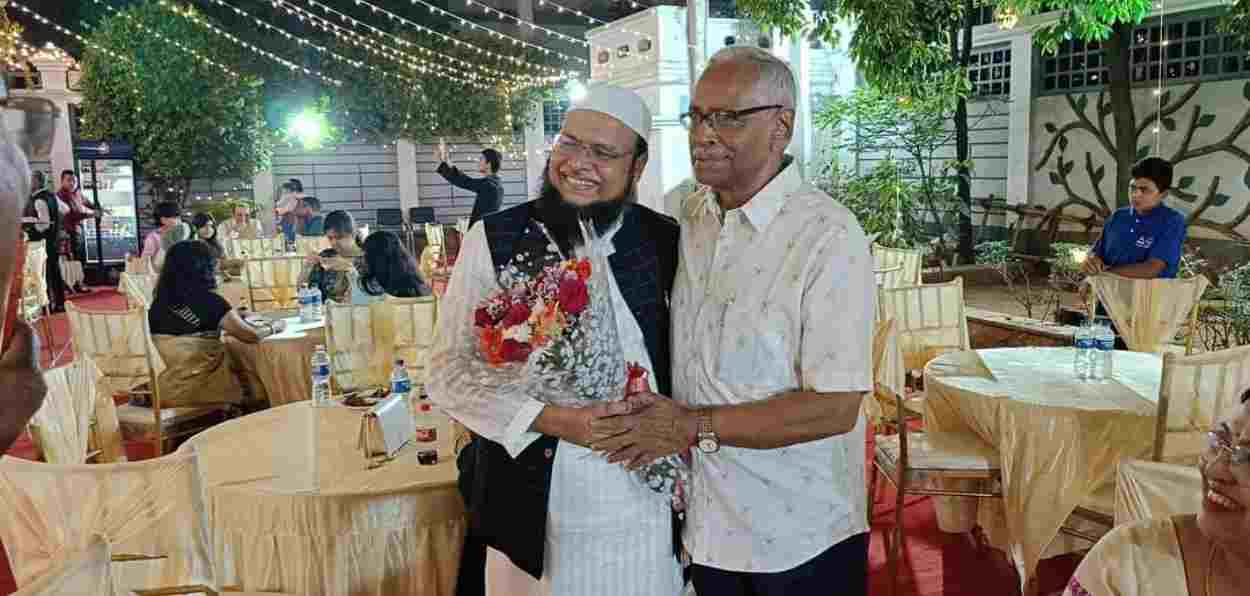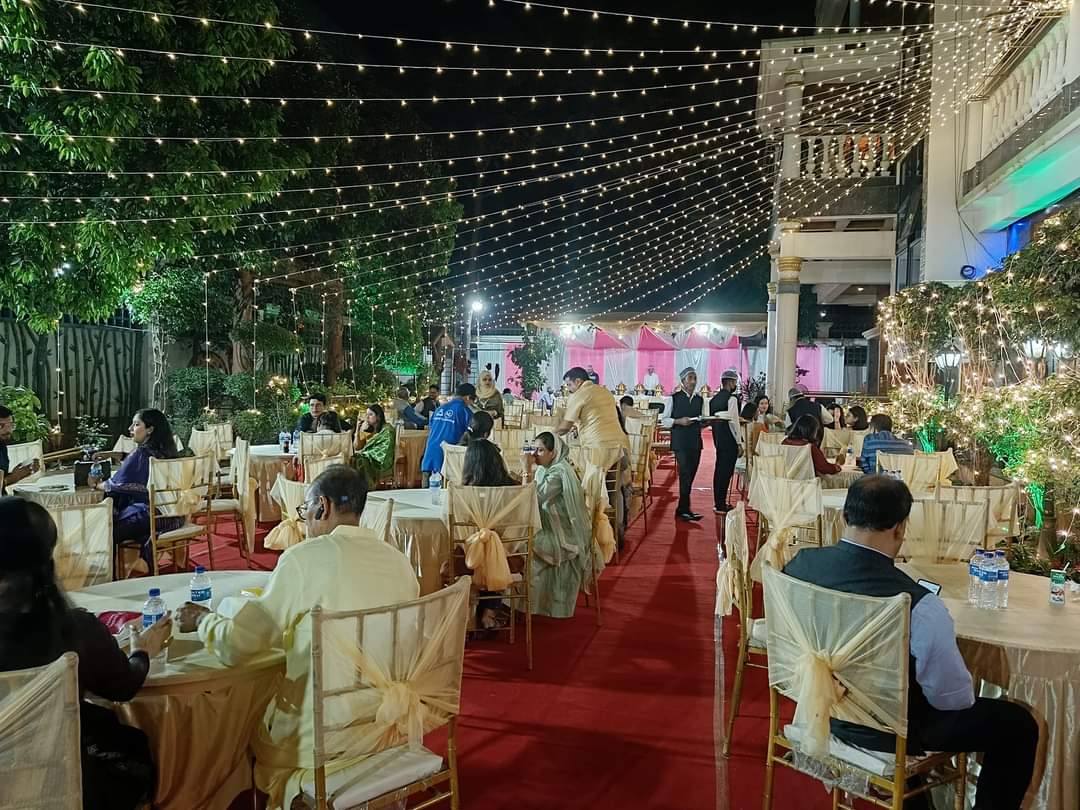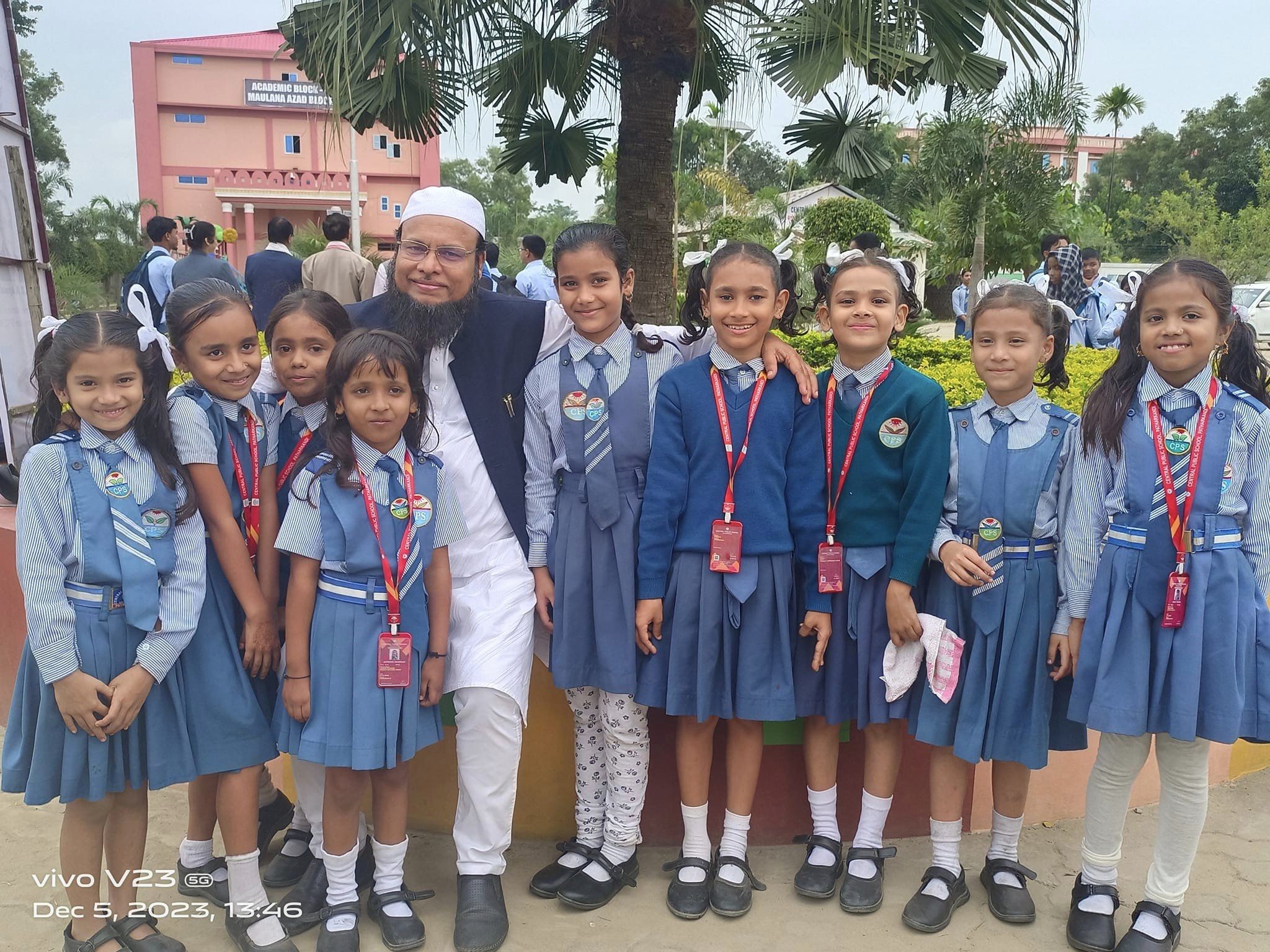
Rita Farhat Mukand
As the well-known educationist Mahbubul Hoque couldn’t make it to his village this Eid-ul-Fitr due to an anticipated inspection of his upcoming project - the P A Sangma International Medical college and hospital in Meghalya on the Assam border, he hosted 150 doctors, who had recently joined the hospital, and their families, to celebrate Eid and pre-Bihu (Assamese New Year) festivities at his home.
The invitees included the former governor of Meghalaya Ranjit Shekhar Mooshahary, Prof ( Dr) Dhrubajyoti Bora, Vice Chancellor, of Srimanta Sankardeva University of Health Sciences, and in attendance to host them were Mahbubul Hoque, his wife and two sons. Most of them quipped, “We have never experienced this before.” Hoque shared a little about his journey and the upcoming 1150-bed hospital on the new campus.”
The chief guest of the party was Mr Vincent, CGM of the State Bank of India that has sanctioned loan for the Medical-college project.
The food was a mix of vegetarian favourites traditionally cooked for Bihu, and non-vegetarian delights including the Eid biryani along with mutton and chicken roasts, and an assortment of exotic juicy sweet fruits. Hoque gifted Eidi - an exquisite cloth that each one could take his pick from an assorted display.
.jpg) Mahbubul Hoque at his Eid-Bihu party
Mahbubul Hoque at his Eid-Bihu party
Chancellor Mahbubul Hoque spoke with Awaz-the Voice about his special Eid-Bihu celebration. He said, “I normally go home to my village for Eid, which is 300 kilometers from Guwahati as celebrating festival in the village is my cherished experience.” Born in a remote village called Purbogool in Patharkandi, Karimganj district of Assam, Chancellor Mahbubul Hoque rose from humble beginnings accomplishing great strides by becoming the founder of many institutions including the University of Science and Technology Meghalaya and chairman of the Education Research and Development Foundation in Guwahati.
Mahbubul Hoque's memoirs of the village life unveil why he has reached out to build the educational infrastructure to such heights creating history by kick-starting two CBSE schools in small townships.
On his memories of celebrating Eid, he spoke about “the most unusual” celebration when he was in primary. “On the morning of Eid, I woke up early, tumbled out of bed and the first thought that came to my mind was my Dadi (father’s mother). Without washing my face, brushing my teeth changing my clothes, or informing my parents, I rushed out of my home eagerly because I wanted to meet my Dadi. Now my Dadi lived quite far away near a river, but close enough to walk, and by the time I reached her home, I was flushed and happy, she stared at me stunned at my sudden arrival alone, in a dishevelled state, and scolded me a little, though lovingly.”
All in all, he remembers having a very happy Eid with her.
“The very next year, on Eid at around late morning, we got the sad news that my grandmother passed away. I was devastated because I was very close to my grandmother. She filled a great void in my life with her kindness and presence. One can notice that in villages, grandparents take a big place in a child’s heart. This is because parents are often busy but grandparents are there for them and this is the difference between city life and village life.”
 Doctors and their families celebrating Eid-Bihu at Mahbubul Hoque's residence
Doctors and their families celebrating Eid-Bihu at Mahbubul Hoque's residence
Mahbubul Hoque believes that the family is a stronger unit in a village setup. “Unlike my first Eid, as the years rolled by and I reached middle school, I matured and during Ramadan and Eid would go to the mosque say Namaaz with my elder brother and my perspective was more focused.”
Hoque was raised in a large family of eight brothers and two sisters who were very united and strong. He said, “Celebrating Eid in the village is wonderful. I feel a little remorseful as this year I have not gone home to my village and my bhatija (nephew) and bhatiji (niece) are sad! We have special times in the village. On Eid, my emphasis is always on the poor. In the village, all the people know me, and as I help them, they also pour out greater duas for me, so this is a very blessed time in the richness of prayer and fellowship. The simplicity of celebrations is refreshing with only sharing of sweets such as Sandesh with no other big extravagances but it is the purity of hearts that makes this time extra special.”
Mahbubul Hoque's inspiring journey reveals a compassionate soul driven by a passion to empower the children and youth of the Northeast with high-quality yet affordable education. The path to realizing this dream was riddled with challenges, yet he persisted, continuously striving for greater heights and adapting to new roles along the way.
At a young age, tragedy struck when he was in the seventh grade; his father, a Panchayat Secretary, passed away. The pain deepened during his 12th grade when his mother also left this world, leaving his elder brother as his main source of solace and support. He initially, sold home-grown vegetables in the local market and later tutored schoolchildren to fund his education. Throughout these hardships, his elder brother Qoumrul Hoque stood by him also providing unwavering support and helping finance his education.
 Students of CBSE-afficilated school, Badarpur, Assam with Dr Mahbulbul Hoque
Students of CBSE-afficilated school, Badarpur, Assam with Dr Mahbulbul Hoque
Later, when he studied at Aligarh University, he experienced a grievous loss when his elder brother passed away in a road accident. With his brother's support for his education abruptly cut off, Hoque found himself in a difficult situation. To finance his studies, he resorted to conducting tuition classes. During his time at AMU, Mahbubul Hoque emerged as a thoughtful person. Whenever he wanted to find respite from his studies, he sought comfort at his favourite spot, the tomb of Sir Syed Ahmad Khan paying homage to the visionary founder of the prestigious university. Little did he know then that he would later be celebrated as the "Sir Syed of North East" for his groundbreaking initiatives in advancing modern education in the area.
After graduating from AMU, Hoque turned down lucrative job offers from both Indian and international corporations, opting instead to pursue his passion - returning to Guwahati to contribute to society through educational advancement.
Choosing to venture into entrepreneurship, Hoque recognized the growing demand for Computer Science courses. Leveraging his proficiency with computers, he visualised launching a private IT startup in collaboration with others. However, he faced suspicion from the community, with a well-known businessman and community leader, who currently leads a political party, discouraging him, citing concerns about his traditional attire hindering his success. Overcoming obstacles and opinions, he determinedly pushed ahead.
Today, this dynamic leader champions education from early childhood to advanced degrees, creating history with two CBSE Affiliated Senior Secondary Schools in villages as usually CBSE schools are not established in villages and he is the founder of many institutions including an AICTE-approved Engineering institution, and chairman of the Education Research and Development Foundation in Guwahati.
“I feel that Eid celebrations in the city are shallow while in the village are more connected heart-to-heart gatherings of true camaraderie and oneness where one experiences greater joy. I always place a special emphasis on the poor doing something for them because without giving, the celebration has lost its meaning.”
ALSO READ: Mahbubul Hoque is India's trailblazing Sir Syed of the North East
His life mirrors his sincerity in building society and educating and empowering the poor, a trait that is rare to find in the modern-day jumble of commercializing education for personal gain, Chancellor Mahbubul Hoque spurns such "shallow" material conduct and as he said in an earlier interview, “There is no point in living a luxurious life and showing off. Life and wealth are from the Almighty for doing good deeds and to serve the society for which we are answerable on the Day of Judgment”
Rita Farhat Mukand is an independent writer
